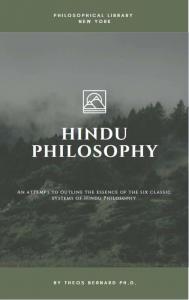
Hindu Philosophy is an attempt to outline the essence of the six classic systems of Hindu Philosophy, namely; Nyaya, Vaisesika, Samkhya, Yoga, Mimarinsa, and Vedanta. All other schools of thought are but variations of these six. Only one additional school is presented in the book, the Kasmir Saivism (Shaivism) which gives the most detailed analysis of the Ultimate Principle; however, it can hardly be fully understood util the other six systems are comprehended, the author states. To understand correctly Hindu Philosophy, it is paramount to realize that the basis of all the schools is the same. Together they form a graduated interpretation of the Ultimate Reality.
Six schools – six approaches to Hindu Philosophy
Each school is based on the same metaphysical doctrine, while discussing some particular aspect of the whole. For example: Nyaya discusses the means by which knowledge may be had of the Ultimate Reality; Vaisesika, the things to be known about that Ultimate Reality; Samkhya, the evolution of metaphysical doctrine; Yoga, the metaphysical doctrine in relation to the individual; Mimarinsa, the rules and method of interpreting the doctrine; Vedanta, the relationship between God, Matter, and the world; and Kasmir Saivism, the nature of the Ultimate Spirit and the Cause of the Initial Impulse. This outline is intended merely to show the interrelationship of these schools and how each assumes the doctrines of the other while it solves its special problem. In this introduction by Theos Bernard from 1947 to the classic philosophical schools of India, there is no attempt to prove or disprove but rather to present the system of each school.
The classic philosophical systems of India
From the book:
According to Indian tradition there is only one Ultimate Reality, but there are six fundamental interpretations of Reality. These are called the Sad Darsanas or “six insights,” because they give man sight of the sensible verities and enable him to understand in the light of reason the super-sensible Truth attainable only through the revealed scriptures or through the experience of nis (sages). The word darsana comes from the root drs, “to see,” and is the Sanskrit term used for philosophy. The six darsanas constitute the classic philosophical systems of India.
Download the free PDF e-book Hindu Philosophy here (226 pages/4.66 MB):
 Hindu Philosophy
Hindu Philosophy

My life